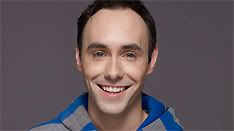When I was in my mid-teens I developed acne. Never having been one to do things by halves, mine was in the form of angry boils flowering luxuriantly over my fizzog. I didn't have much of a problem with it, and didn't get more hassle than one might have expected in a working-class Glaswegian housing estate.
Then I went to university in Italy, and the head of my college decided he did have a problem with my acne, and at his insistence I set out on courses of antibiotics and various other pills and potions - one of which, as I remember, turned my first wee of the morning bright red, which was quite a thing if you weren't prepared for it.
During my first year at uni I fell into a deep depression, and I wonder if the head's effective declaration that my appearance was undesirable contributed to the mix of being away from home from the first time and studying like I'd never done before. But the past can be a dangerous place to form assumptions about, so who knows?
 I found myself thinking about this period of my life for the first time in a while after an advert directed me to BBC Radio 1's listen-again feature, where Aled Jones from the Chris Moyles show (me neither) had hosted a "surgery" about body-image, when a young man called in to speak about his desperation that nothing his doctor gave him was touching his acne. I felt for him.
I found myself thinking about this period of my life for the first time in a while after an advert directed me to BBC Radio 1's listen-again feature, where Aled Jones from the Chris Moyles show (me neither) had hosted a "surgery" about body-image, when a young man called in to speak about his desperation that nothing his doctor gave him was touching his acne. I felt for him.An American psychotherapist called Aaron Haydn Jones explained the process of filtering, whereby we might ignore 100 positive comments and dwell on one negative one. I can't argue with that - Richard Carpenter attributed one journalist's comments about his sister's weight in the early 1970s to her tortured death in 1983.
The show, however, wasn't exclusively about anorexia and bulimia as such but about unhappinesses with one's body (which might admittedly feed the pathogenesis of one of these terrible illnesses). I started to wonder about the direction of the show when one chap rang in to complain about the shape of one of his eyebrows, but then a young woman said that she'd had problems with her mum after she (filia) had a breast reduction: Aaron was running with the ball immediately, and wondered if the girl had had cosmetic surgery for what was a relational problem, and spoke of feelings of jealousy - or at least displacement - that can sometimes occur between mother and daughter, father and son. Then, of course, another young woman rang in to complain that her breasts were too small.
 Something that's been in the news recently is airbrushing - a case in point being a photo of model Phillipa Hamilton where her waist appears smaller than her head, an image that made fashion house advertisers Ralph Lauren regret their use of Photoshop and ultimately issue a reluctant apology. To indicate the power of the program, some Radio 1 figures allowed their images to be retouched and posted on the website.
Something that's been in the news recently is airbrushing - a case in point being a photo of model Phillipa Hamilton where her waist appears smaller than her head, an image that made fashion house advertisers Ralph Lauren regret their use of Photoshop and ultimately issue a reluctant apology. To indicate the power of the program, some Radio 1 figures allowed their images to be retouched and posted on the website.Where things started to get interesting was when Emma Ledger, deputy editor of More clebrity magazine, came on the show briefly to say that the publication had no policy as to the sizes of models whose photos it published, and that it only airbrushed to get rid of zits or tidy up hair. "Who wants to see a zit on the cover of a magazine?" she moaned, and suddenly I realised that perhaps punk had a point after all.
The first thing I did was to reflect that if a mag is publishing pics of clothes that are supplied to it, its in-house policies on model sizes are meaningless if the sample garments supplied to
 it only fit "size-zero" models; something which caused (British) Vogue editor Alexandra Schulman to fire off an angry letter to designers.
it only fit "size-zero" models; something which caused (British) Vogue editor Alexandra Schulman to fire off an angry letter to designers.The second thing I did was to buy a copy of More, and try not to look too embarrassed as I payed for it. This is something I did when suspicious about Now editor Abigail Blackburn's protestations of innocence to Louise Redknapp, who had accused her magazine of triggering "pregorexia; the issue of Now
 brought out to coincide with Redknapp's crusading documentary was a celebrity pregnancy special, but the devil was in the detail, and the detail turned out to be in the back issues.
brought out to coincide with Redknapp's crusading documentary was a celebrity pregnancy special, but the devil was in the detail, and the detail turned out to be in the back issues.I have no back issues of More, but on flicking through the magazine did find an advert for Tesco Clothing Online featuring a photo of a woman who looked as though she had other priorities than eating. Had the magazine been supplied with the pic, or with clothes that would only fit somebody of her dimensions?
What caught Maxima's eyes made a bee in her bonnet buzz furoiusly: she pointed to a photo of Sarah Harding of Girls Aloud with (I think) Tom Crane, and, pointing to Crane's form (which compared to mine looks skeletal), demanded to know why men could look any way they wanted while women had to look like Barbie. At least she let up quite soon - one Hogmanay she went on and on about male performers looking like they'd been dragged through a hedge while female ones were expected to exude glamour. At least s
 he had a point. But I hope the bloke who phoned in to complain about his eyebrow never had a look at the "More man of the week" (Kellan Lutz from vampire flick Twilight); no wonder illicit steroid sales are booming, as vulnerable young men think they have to "get ripped". It's not for me to contradict Emma Ledger and say that the photo was digitally manipulated, but Radio 1 DJ Vis showed that it could be done (see pic below).
he had a point. But I hope the bloke who phoned in to complain about his eyebrow never had a look at the "More man of the week" (Kellan Lutz from vampire flick Twilight); no wonder illicit steroid sales are booming, as vulnerable young men think they have to "get ripped". It's not for me to contradict Emma Ledger and say that the photo was digitally manipulated, but Radio 1 DJ Vis showed that it could be done (see pic below). Ledger did stress that her magazine was for 18-26-year-olds ("of all shapes and sizes"), but the feature that gave me most cause for concern was nothing to do with body-image, rather "position of the week", demonstrated with Barbie and Ken dolls. I thought of the poor girl who texted Jones' show to say that she only felt good about herself if a boy told her she was pretty, and felt furthermore that the only way to bring this about was to sleep with said boy. I remembered sadly the travellers' tales of former colleagues in drugs work, who had given talks to schoolchildren and reported back that girls said that some boys threatened to spread the word that they were "frigid" if they refused to have sex. Sometimes we fellows are unconscionably nasty people, and moreover, while More is by no means the worst offender, I'm also not sure what Ms Ledger thinks happens to somebody on their 18th birthday to make them less vulnerable to masculine con-tricks than they were at 17 years and 364 days old.
Ledger did stress that her magazine was for 18-26-year-olds ("of all shapes and sizes"), but the feature that gave me most cause for concern was nothing to do with body-image, rather "position of the week", demonstrated with Barbie and Ken dolls. I thought of the poor girl who texted Jones' show to say that she only felt good about herself if a boy told her she was pretty, and felt furthermore that the only way to bring this about was to sleep with said boy. I remembered sadly the travellers' tales of former colleagues in drugs work, who had given talks to schoolchildren and reported back that girls said that some boys threatened to spread the word that they were "frigid" if they refused to have sex. Sometimes we fellows are unconscionably nasty people, and moreover, while More is by no means the worst offender, I'm also not sure what Ms Ledger thinks happens to somebody on their 18th birthday to make them less vulnerable to masculine con-tricks than they were at 17 years and 364 days old.Now I only look in the mirror on those occasions when I have no choice but to shave and comb my hair; but I remember a strange young man who would examine his image, although I'm no longer sure what he was looking for or even at. Young people today are not the means to enrichment of the staff of celebrity magazines and/or the shareholders of companies that own them. It's no cliché that children are the future: young people will father and bear our grandchildren, will work in supermarkets and universities and, among a milion other things, will hopefully enjoy life enough to convince the grumpier among us that there's a point to it all.
And, on a personal note, I'd like to send a message to the young man with acne. Nothing worked for me either - but it faded in every way as I got older.
Related posts:
Abigail Blackburn and the truth about pregorexia
Claire Sweeney's big fat...











Very brave of you to admit your 'situation' in your youth.
ReplyDeleteNow that we have photoshop, people are learning, even young people, that what they see is not the truth. The perfection that we see on magazines is still just someone's opinion of what is perfect, but it's not even true or real in any form.
Every culture is has it's own idea of what is perfect, and even in the cultures without magazines or television people have in their heads what a person SHOULD look like. African cultures, with their bizarre idea of beauty, torture its members with body stretching and piercing activities that would scream "abuse!" in our culture. The Japanese, for centuries, bound their babies' feet until the litte girls couldn't walk because small feet is 'desired'.
We as humans have this basic (terrible) need to creat an ideal and force everyone to conform or suffer being ostracized in some way.
It's not just America, or Europe, it's an effect of original sin, perhaps that makes people compete and create something higher to obtain that is physical instead of spiritual, because it's more tangible to control.
I know what you mean about Photoshop, but really good practitioners can make a lot of subtle changes that are difficult to spot unless one has a very good knowledge of anatomy, not something young folk are thinking about when they open one of these mags. When I asked my older daughter what More was like, she told me "at least it's not one of those that have photos that make you feel really bad".
ReplyDeleteI think you're right about original sin - the old serpent still whispering in our ears, telling us that humanity can be perfected using only what exists within Creation, which has fuelled every dystopian fable from Plato to Orwell. It's about control, as you say.
My mom cut out an article for my daughter which recommended Milk of Magnesia for acne. For what it's worth.
ReplyDeleteI've heard of milk of magnesia applied topically to acne over here - I don't know how effective it is but, if nothing else, it must be one of the least harmful therapies!
ReplyDelete